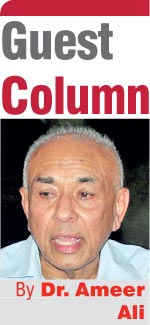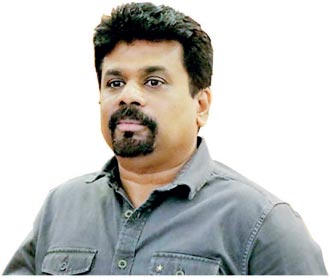Sunday Feb 15, 2026
Sunday Feb 15, 2026
Friday, 19 January 2024 00:00 - - {{hitsCtrl.values.hits}}
 “Probably, the single most prevalent claim advanced by the proponents of a new paradigm is that they can solve the problems that led the old one to a crisis.” (Thomas Kuhn)
“Probably, the single most prevalent claim advanced by the proponents of a new paradigm is that they can solve the problems that led the old one to a crisis.” (Thomas Kuhn)
“A new scientific truth does not triumph by convincing its opponents, but rather because its opponents eventually die, and a new generation grows up that is familiar with it.” (Max Planck)
Year 2024 has just dawned and Sri Lanka is already in the grip of election fever. Led by President Ranil Wickremesinghe every leader or spokesperson of every political party and pressure group is trying to score points by pointing fingers at each other for the country’s poly-crisis. RW wants to hold the Presidential Election first while the Opposition demands a General Election ahead of it. Whichever the election that comes first the issue facing the country today and the choice people have to make is an epochal one. It is a choice between getting rid of the present Constitution that upholds a moribund ethnonationalist majoritarian socio-political paradigm, and replacing it with a new paradigm based on secular democracy enshrined in a new Constitution guaranteeing every one of the country’s citizenry all democratic freedoms, human right protection, economic justice, and above all accountability of governance. This paradigm shift would also entail restructuring the economy in such a manner as to keep it market friendly but with increased focus on a rejuvenated domestic production sector.
 Revolution through the ballot
Revolution through the ballot
The current model has created two Sri Lankas, one for the haves and the other for the have-nots, and in the name of competition and free enterprise it has allowed rigidities to emerge with state tolerance to curtail competition. The economy therefore needs remodeling within the parameters of the new paradigm so that the market would be free of rigidities and domestic producers and consumers are protected from shocks emanating from international competition. Hence, the forthcoming election is not simply one of changing the President or the Government but one of creating a new Sri Lanka in which every citizen should be free to contribute to the best of his/her ability and should receive according to his/her needs. The outcome of the election therefore, would virtually mean a revolution through the ballot.
Of all the candidates who have advertised themselves as probable contestants for the country’s presidency and political parties or coalitions vying to capture the next Government, only Anura Kumara Dissanayaka (AKD) and his JVP led NPP is promising to stage a “social revolution” to change the country’s “political culture” and redesign the economy to solve the crises generated by the current model. Such redesigning would mean the NPP is not going to allow the so-called free-market-open-economy model to dictate economic priorities and shape Sri Lanka’s growth path. This would inevitably push NPP to confront the IMF whose post-bankruptcy recovery plan and growth trajectory have been accepted as fait accompli by all other parties.
NPP’s decision to go solo
The fact that the NPP is determined to run the race solo without coalescing with any of the other parties is further indication of fundamental policy differences between the NPP and its opponents. While RW and his UNP believe that the IMF drawn recovery path is the only way to end the country’s poly-crisis, and while the other parties are picking and choosing one or two of IMF recipe’s painful elements such as broadening the tax base and domestic debt restructuring that are hurting the most vulnerable, and therefore, proposing to renegotiate with the IMF in that regard, none of them is prepared to change the socio-political paradigm within which the IMF agenda is being introduced. The IMF itself has pointed out this misfit when it called for governance reform. Also, lessons learnt from the bitter experience of a former coalition between the leftists and the SLFP in 1970, that ultimately discredited the progressives and buried their chances of governing forever must have contributed to the NPP’s decision to go solo.
Yet, the NPP has more homework to do if it were to receive an intergenerational mandate to govern on its own. The ageing generation of voters without whose support the NPP cannot win, are the most conservative of the lot who would reject any radical change to the old order but may accept some fine tuning based on the inevitability of gradualness. That generation is still agonising over reminiscences of the JVP’s resurrectionary past and is suspicious of the JVP’s NPP garb. Therefore, NPP needs to convince this conservative segment that the current leadership of JVP and that of its partners belong to the post-cold war generation schooled in the dialectics of a globally integrated techno-scientific civilisation, and that their ideology is not doctrinaire but pragmatic and futuristic. That the market friendly nature of the NPP’s economic model is a differentiated product within the open economy model needs to be stressed and explained to clear the lingering doubts about JVP’s romantic affiliation with closed economy models.
This does not mean that the new generation of voters entirely are in bed with the NPP. It’s true that the Aragalaya generation would welcome the paradigm shift. It would embrace secular democracy with accountability in governance and a market friendly economy but free of state-linked rigidities. At the same time, members of that generation are also worried about their own future, not necessarily within Sri Lanka but on a global level. This generation’s outlook and expectations are influenced by its linkage with the outside world through the internet. But decades of ethnonational politics that brought the swabasha education has made this generation unfit to compete for employment in the world market, a fact pointed out by the World Bank recently. The NPP’s educational policy therefore needs to be explained to convince the young generation of voters. The country’s education system including the medium of instruction requires a complete overhaul. By getting rid of English Sri Lanka lost a golden opportunity to emerge as an exporter of education at least to the Asian and African regions. Private schools and private universities are not the solution. The NPP’s educational policy therefore needs publicity.
Foreign policy is another area where NPP has to clear some clouds. Once again it is the JVP’s past that is creating unnecessary fears among discerning voters. With the Indian Ocean looming large as the regional theatre of a new cold war, and Sri Lanka being strategically placed in it, the area of foreign policy requires expert handling, because the future of the economy is closely tied with it.
Time for serious colloquia at district and provincial levels
Thus, governance, economy, education and foreign policy are areas in which the NPP has to do some homework to convince the discerning voters. The time has come for its campaign to advance from the level of crowd pulling mass oratory and random media blitzes to the level of serious colloquia at district and provincial levels to explain its concrete policies and face the critics. No doubt the NPP has the will and the capacity to bring about a social revolution to change the ethnonational political culture, cleanse the economy of mafia control to allow small and medium level enterprises to flourish, establish a corruption free administration where merit would be the sole denominator for appointments and promotions and to prevent the country being exploited by foreign powers because of its current economic weakness. But more homework is needed to sell these credentials to a suspicious but ageing generation of voters that seems to have an edge in deciding the winners.
The writer is attached to the Murdoch Business School, Murdoch University, W. Australia